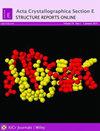双-{2,4-二叔丁基-6-[(异丙基-亚氨基)-甲基]苯酚-κ(2) N,O}锌二氯甲烷单溶剂化物的晶体结构
IF 0.9
Acta crystallographica. Section E, Structure reports online
Pub Date : 2014-11-05
eCollection Date: 2014-12-01
DOI:10.1107/S1600536814022636
引用次数: 0
摘要
在标题化合物[Zn(C18H28NO)2]·CH2Cl2中,Zn(II)原子被两个晶体独立的水杨基醛亚胺配体N, o螯合,形成一个扭曲的四面体配位球。两个金属循环平面之间的二面角为88.69(6)°。观察到分子内非经典C-H⋯O氢键相互作用。在晶体中,复杂分子沿着a轴堆叠成柱状。二氯甲烷溶剂分子位于这种排列的空隙中。本文章由计算机程序翻译,如有差异,请以英文原文为准。
![Crystal structure of bis-{2,4-di-tert-butyl-6-[(iso-propyl-imino)-meth-yl]phenolato-κ(2) N,O}zinc di-chloro-methane mono-solvate.](https://img.booksci.cn/booksciimg/2014-11/2023121478278109997989056326307.jpg)
![Crystal structure of bis-{2,4-di-tert-butyl-6-[(iso-propyl-imino)-meth-yl]phenolato-κ(2) N,O}zinc di-chloro-methane mono-solvate.](https://img.booksci.cn/booksciimg/2014-11/202312147827910733631248828861.jpg)
![Crystal structure of bis-{2,4-di-tert-butyl-6-[(iso-propyl-imino)-meth-yl]phenolato-κ(2) N,O}zinc di-chloro-methane mono-solvate.](https://img.booksci.cn/booksciimg/2014-11/2023121478292124012759938943490.jpg)
Crystal structure of bis-{2,4-di-tert-butyl-6-[(iso-propyl-imino)-meth-yl]phenolato-κ(2) N,O}zinc di-chloro-methane mono-solvate.
In the title compound, [Zn(C18H28NO)2]·CH2Cl2, the Zn(II) atom is N,O-chelated by two crystallographically independent salicyl-aldehyde imine ligands, leading to a distorted tetra-hedral coordination sphere. The dihedral angle between the planes of the two metallacycles is 88.69 (6)°. Intra-molecular non-classical C-H⋯O hydrogen-bonding inter-actions are observed. In the crystal, the complex mol-ecules stack into columns along the a axis. Di-chloro-methane solvent mol-ecules are situated in the voids of this arrangement.
求助全文
通过发布文献求助,成功后即可免费获取论文全文。
去求助
来源期刊
自引率
33.30%
发文量
0
审稿时长
1.3 months
期刊介绍:
Acta Crystallographica Section E: Structure Reports Online is the IUCr highly popular open-access structural journal. It provides a simple and easily accessible publication mechanism for the growing number of inorganic, metal-organic and organic crystal structure determinations. The electronic submission, validation, refereeing and publication facilities of the journal ensure very rapid and high-quality publication, whilst key indicators and validation reports provide measures of structural reliability. In 2009, the journal published over 4000 structures. The average publication time is less than one month.

 求助内容:
求助内容: 应助结果提醒方式:
应助结果提醒方式:


